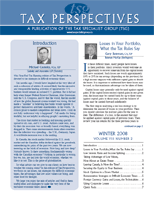
PDF Format
 Issue Contents Issue Contents
 All Issues All Issues
Winter 2008
Volume 8, Number 2
The information in Tax Perspectives is prepared for general interest only. Every effort has been made to ensure that the contents are accurate. However, professional advice should always be obtained before acting and TSG member firms cannot assume any liability for persons who act on the basis of information contained herein without professional advice.
Remuneration Strategies in Difficult Economic Times
By Peter Weissman, CA, TEP
Cadesky and Associates LLP (Toronto)
Business owners need to be concerned about the remuneration strategies they adopt in these difficult economic times.
It is typical for an owner-manager of an active business to take a bonus, so reducing the income of the corporation to $400,000. This is the limit for the small business deduction (the low rate of corporate tax). Above this, the corporate tax rate jumps from around 16% to around 33%. The time-honoured tradition of bonusing to the small business deduction limit may be a sensible remuneration strategy in normal times; however, in circumstances where the corporation incurs losses in a future year, this strategy can be very costly.
Assume that an owner-manager takes a significant bonus from a profitable corporation, and pays personal tax on the bonus at the top tax rate (about 46% in Ontario). Assume the corporation retains income of $400,000, which will have been taxed at the small business rate of around 16%. In a subsequent year, the corporation has a large loss. This loss can be carried back to any or all of the three prior taxation years. Unfortunately, since there is only $400,000 of income retained and taxed in each of these years, the maximum amount of the loss that can be deducted will be $1,200,000. Worse still, the recovery rate will be at around 16%. Meanwhile personal tax was paid at almost three times this rate!
It may be preferable to leave income in the corporation if losses are anticipated in the future, even if the income is subject to tax at the higher corporate tax rate. In this way, if the corporation sustains future losses, a much larger potential tax recovery will be available.
A similar strategy will apply to corporations that earn investment income, including rental income. Often dividends will be paid to realize a lower tax rate in the corporation, in exchange for paying personal tax. If the corporation suffers a future loss that is carried back, the tax recovery from the carryback will be much lower than if dividends had not been paid.
At this point in the economic cycle, it is time to question the traditional rules of thumb for taking remuneration from private corporations. The chosen strategy should take into account the possibility that a future loss could be sustained, and consider how to reduce its cost through tax recoveries should these circumstances arise.
| 




